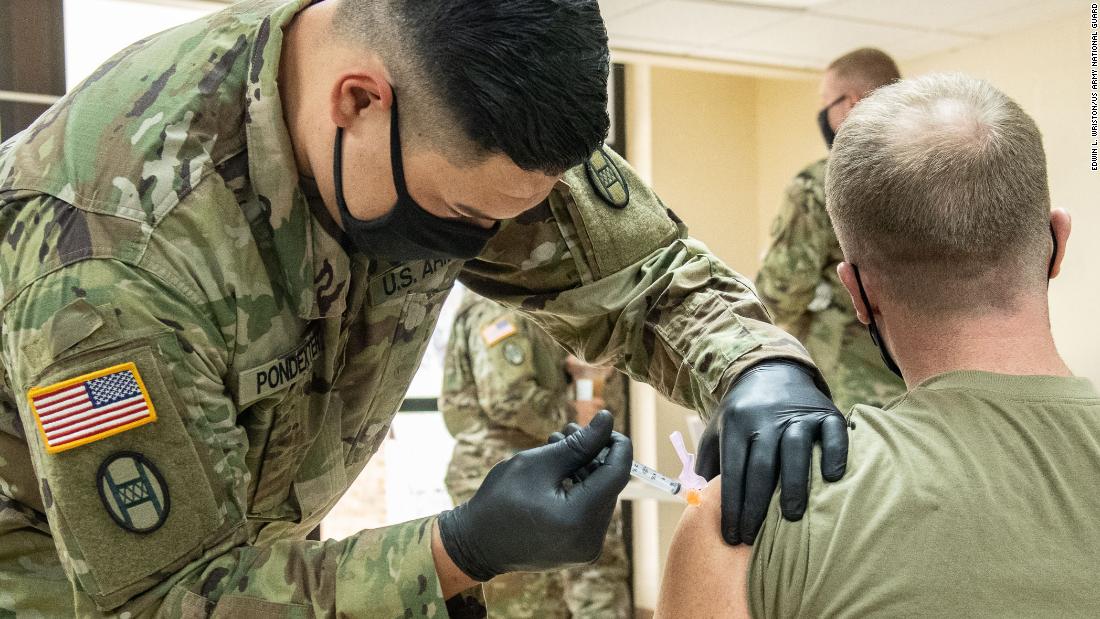Two teams tested two of the new variants against blood drawn from people who received the full dose from two courses of Moderna or the Pfizer vaccine.
Although mutations in the new virus variants – one seen for the first time in Britain and the other first identified in South Africa – would allow some of the vaccine-induced immunity to escape, it was far from a complete escape, the two teams reported. separately.
A team led by Dr. Michel Nussenzweig of Rockefeller University tested plasma taken from 20 people who received two doses of the Pfizer / BioNTech or Moderna vaccine as part of clinical trials.
They found that the vaccines produced strong antibody responses, as well as cells that continue to produce new antibodies for months or years. “We measure their antibody responses to the wild-type virus. Then we take their plasmas and measure them against variants,” Nussenzweig told CNN.
Wild type virus is the generic name of the virus that generally circulates, but has not been changed enough to be designated as a variant.
“When you start putting all of these antibody mixes together, which means that together they can take care of the variants,” said Nussenzweig. Even though they have a reduced effect, overall the response was so overwhelming that it shouldn’t matter, he said.
“What we really want to do with these vaccines is to keep people out of the hospital. It is extremely likely that they will do it, regardless,” added Nussenzweig.
Eventually, vaccines should be updated – but the new mRNA vaccines made by Pfizer and Moderna can be changed very quickly. “Should vaccines be adjusted?” he asked. “Probably – but that doesn’t mean they won’t be effective.”
“More data is needed to monitor the effectiveness of the Pfizer-BioNTech COVID-19 vaccine in preventing COVID-19 caused by new variants of the virus,” the companies said in a joint statement.
“So far, for COVID-19 vaccines, it has not been established which reduction in neutralization may indicate the need for a change in the vaccine strain. If a change in the vaccine strain is necessary to deal with variants of the virus in the future, the companies believe that the flexibility of BioNTech’s proprietary mRNA vaccine platform is well suited to allow such an adjustment. ”
Moderna and Pfizer vaccines are designed to be quick and easy to adjust.
The coronavirus undergoes constant mutations, like many other viruses. Compared to the flu, the changes were slow and did not appear to affect the severity of the illness caused by the infection.
But at least two of the variants – one seen for the first time in Britain and known as B.1.1.7 and the other seen for the first time in South Africa and known as B.1.351 – appear to make the virus more contagious.
Scientists are racing to see if changes in the virus will make him susceptible to available treatments and vaccines.
Earlier this week, Penny Moore, an associate professor at the National Institute of Communicable Diseases in South Africa, published another pre-printed study showing that people who recovered from a wild-type coronavirus infection may be a little more susceptible to B .1,135.
They tested antibody-rich blood serum from 44 people who survived coronavirus infections before September. Half of the people showed an antibody response that could not fight the variant.
Nussenzweig said this is not surprising.
“A small difference in plasma neutralization activity is something we should pay attention to, but it is not a cause for alarm,” he said.
“There is a great diversity in the magnitude of the responses that people get,” he added. “You don’t have to be immunodeficient and you still can’t create a good response to this virus. People’s immune system is as diverse as any other human trait – for example, beauty, intelligence, hair color, their height. Immune system is not different. ”
Nussenzweig said his team’s experiments indicate that it may be the weaker immune responses that are helping to give rise to the coronavirus variants. The longer a person becomes infected, the greater the chance that the virus that infects them will mutate.
“Antibodies can select these variants,” he said.
If a microbe is not completely disrupted by the immune response, the variations that best resist the immune response will be those that survive.
“If people give a suboptimal response, they can start selecting these variants,” said Nussenzweig.
That is why scientists say it is important to vaccinate as many people as soon as possible, so that the virus stops circulating and mutates.
Nussenzweig said his experiments indicate that, until now, the immune response caused by vaccination is often broader and stronger than is necessary to control the virus.
